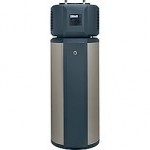
Can a water heater be green? What makes it green? Green is just another way of quantifying energy efficiency and with that in mind some water heaters are green and some definitely are not. The problem is deciding which is and which isn’t. If it were a simple straight forward question, then simply perusing the back issues of consumer reports for which costs the least to operate would solve the problem and we could be on our way to the local big box store to select our green water heater.
There are lots of factors to take into account when deciding which will offer you the most savings in the long run. One of the biggest factors in choosing a water heater is what type you currently have. If you have an electric tank water heater and your brother-in-law is insisting that will see the most savings by installing a gas tankless one just like his, he may not know what he is talking about.
First of all, your water heater location is set up for electric and the wiring is already in place. Installation of a gas tankless is going to set you back a bit. You will need to run propane lines to your new unit as well as venting to the outside.
Another factor to consider is your usage. If you are a large family using a lot of water, your savings will not be as large with a tankless system. Smaller families or just one or two people in a house will experience higher savings. This is because the way the tankless system saves money is by not constantly maintaining a large quantity of heated water for use 24 hours a day, 7 days a week. The tankless only uses gas when you need hot water. This means if you overall demand for water is low then your savings will be higher. As the kids move out, the savings will go up.
There are electric tankless water heaters. They are generally not recommended for a whole house situation because of the amount of current that they draw. If you have a small remote sink that needs a small amount of hot water, an under the sink electric water heater can make sense to avoid both the cost of running gas lines and running lots of water through the lines to get to the hot water.
A third type of water heater to consider is the heat pump water heater. It is a complete, stand alone unit much like an electric water heater. The heat pump portion is found in the extra box on the top of the unit. It works just like your refrigerator. It takes air from the surrounding room, draws the heat out of it and pumps it into the water. Cooler air is exhausted into the room. To install one of these, you will need to be able to place the unit in an area that will remain between 40 and 90 degrees at all times and has lots of air circulation (1000 cubic feet of air). These types of water heaters can be two to three times more efficient than a standard electric one, however, they are still a bit pricey.
So, getting back to your brother-in-law, I’m sure he is saving lots with his new water heater. Determining if the same type will work for you is going to take some number crunching. Don’t just consider the cost of the unit, add in installation, maintenance, and of course operating costs. It helps to know how much you spend on water heating already. If you have an all electric house, your water heater usage is about 12% of your bill. There are plenty of options out there and we haven’t even gotten to solar assisted systems. I’ll save that for another day.
